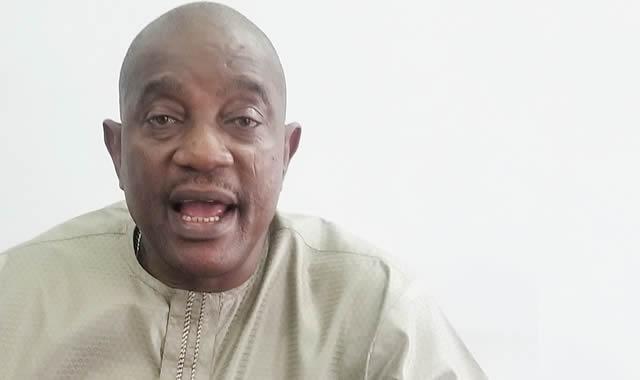A SPEECH DELIVERED AT AN EVENING WITH POLICE AND FRIENDS AT PROVIDENCE OBA AKINJOBI STREET,
IKEJA-LAGOS.
BY IGP SOLOMON ARASE RTD.
The work of the police in any society is a very difficult, complex and dangerous vocation. The expectations of members of the public in Nigeria are many and varied and exceed the resources and support given to the police.
Failures on the part of the police are easily observed and widely reported and condemned while achievements of the police are rarely recognized, applauded and rewarded. Police are in constant contact with dangerous persons and dangerous situations.
In spite of the inherent hostile environment and sundry challenges, the Nigeria Police has remained steadfast to its responsibility of guaranteeing the safety of the lives and property of the citizens even at the risk of their own lives. Between November 2021 – October 2021, 120 police officers paid the supreme sacrifice in the discharge of their statutory mandate in relation to the enhancement of the community peace and security, while 200 others sustained varying degree of injuries. Similarly, between 8th – 30th October 2020 a total of 134 police stations were burnt and vandalized, while a total of 164 police vehicles were destroyed and burnt.
In order to perform its function of effectively preventing and controlling crimes, the police require diverse skills. As an American police chief wrote in 1947:
“Policemen are challenged at every turn to render skilled services to the public. In a routine day a policeman may have to render first aid to an injured motorist, deliver a safety address, trail and apprehend a dangerous criminal, convince a runaway boy on the error of his ways, assist in the prosecution of a criminal case. These and many more are the abilities that the public confidently expects of policemen. Ideally, policemen must have some of the knowledges and skills of the lawyer, doctor, and the engineer; they must possess the endurance of an athlete; have the insight of the sociologist and psychologist and the compassion of a minister. They must present resolute, dynamic, personalities particularly characterized by the magnanimity”.
The work of the police is even made more difficult in societies like Nigeria where there is a mutual distrust between the police and the public, and assistance to the police is often withheld by citizens. Several factors inhibits strong partnership between the citizens and the police in Nigeria. We shall briefly highlight some of the factors that undermined effective partnership between the citizens and the police. The first factor is the circumstance in which the police emerged in the country. Some Nigeria Police historians believe that police forces were introduced to the territories that were occupied by the colonial rulers to promote their interests of exploiting and oppressing the indigenous peoples, and hence, by origin Police forces were established as instrument of colonization. This presents a wrong perception of the police by the citizens. Unfortunately, this mentality was carried over to the post-colonial policing era in Nigeria.
The second factor that affected relationship between the police and the public was the inability of the country to introduce required reforms for the reorientation of the inherited police forces in a manner that will integrate both the police and the community. In this regard, it is recognised, though that successive leaders attempted to introduce varied reforms which were outcomes of several committees on Nigeria Police Reform. While these reform initiatives have led to organisational changes in the Force, the impact on cementing police – public partnership in crime prevention has remained limited.
Third factor is the lack of required resources and skills to ensure the efficiency of the police. Efficiency is a critical factor in developing and sustaining confidence in the police. Sources of inefficiency by the Nigeria Police Force include huge gap between required and provided human and non-human resources made available to the police; deficit in the operational competencies; poor remuneration and conditions of service; misconduct by some officers, and unrelenting criticisms of the police by the public which demoralised the police.
The fourth factor is widespread disrespect for law by citizens across all the sectors and strata of society. Attempt to enforce the law is often resisted by significant proportion of the population who resent support for law, authority and police in Nigeria. Many citizens also do not understand the law and the functions and powers of the police.
Therefore, enforcement of certain laws is considered an unacceptable action on the part of the police.
Further, many citizens expect the police to act on any complaints brought to the Force with dispatch, irrespective of the nature of the allegations, some of which do not constitute breach of criminal law. When police declines, such persons accuse police of corruption or ineffectiveness. Several Nigerians act as if they are above the law and violate the law. When the law is enforced they use different media to discredit the police and other criminal justice agencies. These enumerated and other factors contribute to the generally poor relationships between the police and the public.
WHO REALLY CARES?
The imperative of partnership between the police and the public was underscored by the principle of law enforcement articulated by Robert Peel, pioneer Chief of London Metropolitan police in 1829. The principle comprises nine statements and the first two principles are relevant to our discussion and are briefly discussed below.
The first statement reads “ The basic mission for which police exist is to prevent crime and disorder as alternative to the repression of crime and disorder by military force and severity of legal punishment”. This statement emphasises the significance of prevention of crime and disorder instead of reaction to its occurrence. In order to do this in modern times, police require the citizens to supply them with information for the production of actionable and timely intelligence to guide operations aimed at preventing and disrupting occurrence of crime and disorder. The statement also highlights the primacy of police in internal security operations.
Nonetheless, in exceptional cases of severe disorder, section 217 (2) (c) of the constitution provides that the military could be deployed to suppress insurrection and act in aid of civil authority. The President, Commander – in – Chief of the Armed Forces of Nigeria, relying on this provision, has deployed the military to compliment the police in serious internal security challenges of magnitudes that have practically snowballed beyond the operational capacity of the Police including riot control, combating armed robbery, kidnapping, oil bunkering, militancy and insurgency.
The second statement of the principle emphasised that “The ability of the police to perform their duties is dependent upon public approval of police existence, actions, behaviour and the ability of the police to secure and maintain public respect”. This statement speaks directly to the topic of our discussion today, simply stated, police efficiency is dependent on citizens approval of the existence, actions and behaviour of the police.
One of the problems encountered by the police forces in Nigeria since British colonial rulers established the first police force in 1861 in Lagos is the lack of approval of police existence, actions and behaviours by significant sectors of the society. Responsibility for the conferring and earning the approval rests on the citizens and the police respectively.
The relationship and partnership between the police and citizens in Nigeria are generally unsatisfactory because of several factors. Some of the factors are lack of organizational resources and the capability for effective service delivery; poor conditions of service that affect personnel performance and their relationship with suspects and complaints ; inadequate social interaction between the police and citizens ; indiscipline by some personnel and flagrant violation of law by significant proportion of Nigerians who resent police action to curtail criminality; and lack of appreciation of the nature of police work by citizens.
As earlier stated, police are employed by the society, through its government, to enforce the law and maintain order to guarantee security development. The police will only be effective if the society provides the police with clear mandate, adequate resources, and support for its operation by providing information about factors and individuals responsible for violent conflicts and crime. Intelligence –led policing is the most efficient approach to prevention of crime and disorder.
However, this approach significantly depends on the willingness of the public to provide the police with information to produce and use intelligence. If members of the public protect criminals in their midst, police work will be ineffective and society will be plagued by insecurity. The consequence is that society will be unsafe because of the presence of violent criminals in their midst. This is a problem that has persisted in the country. Distrust between the police and the public has been to the benefit of the criminals, as it inhibits police efficiency while citizens live at the mercy of criminals.
RESPONSIBILITIES OF THE POLICE IN FOSTERING PARTNERSHIP WITH THE PUBLIC.
Effective police – public partnership requires the police to play certain roles including the following:
a) Pay attention to the concerns of the citizens concerning personal safety, security of property, liberties and freedoms, and public order and respond promptly, responsibly and respectfully to demands for police services by citizens.
b) Emplace strategies that galavanize children and youths in primary and secondary schools to develop security consciousness.
These and other measures will promote mutual respect and trust which are important factors in fostering and sustaining partnership between police and the citizens.
ROLES OF CITIZENS IN FOSTERING PARTNERSHIP WITH THE POLICE
Citizens also have responsibility towards the police. The police will be ineffective if the citizens constantly disrespect, distrust, assault, insult and antagonize the police. The constitution, in chapter 2 obliged citizens to assist law enforcement agencies as civic responsibility. Unfortunately, most citizens are either unaware of this obligation or chose to ignore it. In order to enhance police efficiency, develop and sustain effective police-public partnership, citizens and communities should:
- Appreciate the duties and powers of the police and avoid criticizing them just of inconvenience arising from law enforcement intended to guarantee public peace and safety and promote the rights and liberties of others.
- Demonstrate respect for legitimate law;
- Parents, religious , traditional and educational institutions should inculcate in children and youth respect for legitimate authorities and laws at all levels of society without shying away from holding those in authority accountable for their actions, decisions and conduct;
- Challenge and report anyone involved in law – breaking behaviours that are responsible for insecurity and crime and report those who promote, plan, encourage or fund ethnic and religious intolerance, conflict and violence in the country.
- Engage the police to build trust, share concerns about security and welfare, evolve and implement appropriate measure for crime prevention and control within the community and the country.
- Assist the police with information on crimes and criminals within their community and should not assist suspects and criminals to evade arrest.
- Respect the police officers and comply with lawful instructions from them and avoid using police to settle personal or civil scores, which fall outside criminal law and process.
These actions are required from individuals, community based organizations and professional groups in society.
CONCLUSION
Under my watch, I introduced several initiatives directed at promoting police community partnership to drive intelligence – led policing and also bridge the gap between the public and the police. We organised the National Security Summit in August, 2015. The Summit which was attended by the President of the Federation and attracted over 500 participants spread across traditional rulers, public officials, non-state actors and other strategic security stakeholders was convened to dissect the challenge of police-community partnership with a view to developing pathways for strengthening the concept of citizens led policing in Nigeria . The Summit was later replicated at state and divisional command levels across the country with the supports of the United States Institute of Peace (USIP).
Aside this, my leadership dismantled road blocks and introduce safer highway motorised patrol system which was informed by the need to isolate a fundamental component of policing that widens the gap between the police and the citizens. In addition, two Information Communication Technology-driven platforms which provides a real-time avenue for members of the public to report professional misconduct and hold their police accountable were introduced. These are ‘stop the bribes’ and ‘Complaint Response Unit’(CRU). This was heart-warming since when it was established, as citizens took advantage of these platforms in a manner that in the long-term further cemented public confidence in the Nigeria Police.
One of the major efforts aimed at improving officer’ welfare was the housing programme that was given significant attention during my tenure. Towards the end, 400 units of low-cost housing estates were commissioned in Katsina, Adamawa, Edo and Enugu States. The unique thing about the housing scheme is that it targeted the inspectors and
Rank and File Cadre of the Force who do not only represent the most critical operational cadre of the Force but who are the main street bureaucrats whose fear of the future propel them to engage in acts capable of widening the gap between the citizens and the Police.
Beyond these, the Force leadership incorporated the Nigeria Police Scholarship Foundation to extend scholarship opportunities to children of junior cadre officers from Primary to University level. The scheme was launched in December, 2015 with a total of 325 children of members of the rank and file benefiting. If these programmes are sustained they hold the potentials of drastically reducing corruption, improving commitment and performance among police officers, and closing up the trust gap between the police and members of the public.
The Police Force should make efforts to dismantle obstacles to partnership with the public, and hope also that citizens will reciprocate by extending support to the police to enable them carry out their daunting task of ensuring security and safety in a dynamic and increasingly dangerous world. In this way, security, peace and development shall reign in our country.
Thank you for your attention.



